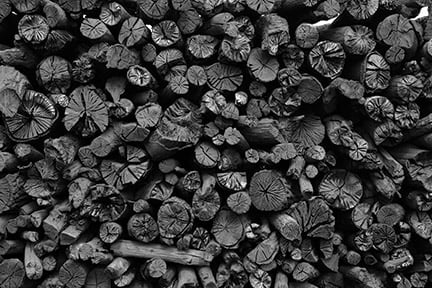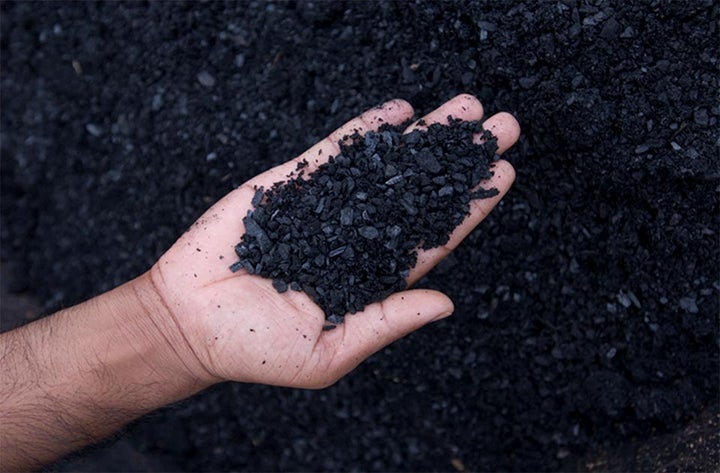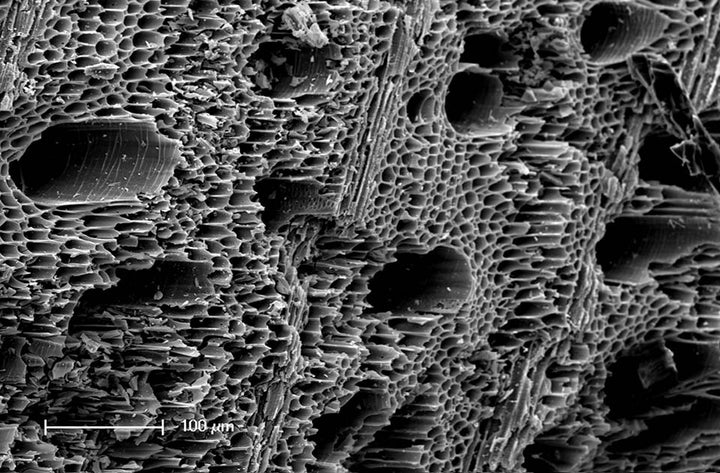
Quick facts
Suitable for - sequestering carbon in soil; potentially beneficial soil improver
Timing - all year round
Difficulty - moderate
What is biochar?
‘Biochar’ is a catch-all term describing any organic material that has been carbonised under high temperatures (300-1000°C), in the presence of little, or no oxygen. This process (called ‘pyrolysis’) releases bio-oils plus gases and leaves a solid residue of at least 80% elemental carbon which is termed biochar.
Virtually any organic material can be pyrolysed to make biochar. Different biochar feedstocks result in biochar with different properties, which is why it is important to know what material your biochar has been made from. Examples include soft plant tissue, woody materials, and manures. The property all of these biochars share is that they are carbon rich and don’t readily .
The idea of using biochar in soils was born from observing the man-made ‘Terra Preta’ soils of the Amazon. The fertility of the poor, acid soils in this region is thought to have been improved through addition of charred organic material by the area’s indigenous inhabitants: helping to sustain population expansion across the Amazon region.
Biochar retains much of the open capillary structure from the original wood, including . In soil these channels continue to function as conduits for air, water, and biology.


What claims are made about biochar?
Biochar incorporation into soil is an important route for CO2 removal from the atmosphere by terrestrial carbon sequestration (Intergovernmental Panel on Climate Change; 2018). Our understanding of biochar and its properties has developed much over recent years, and considerable scientific research is still underway.
Biochar as a soil additive
The application of biochar to soil is known to have various effects;
Positive effects reported include improving plant health through neutralising acidity, providing improved water and nutrient retention (especially in sandy soils) and improved drainage and aeration. Each fragment can also provide a habitat for beneficial soil microbes.
Negative effects are primarily due to the use of biochars with a high (a pH more than 7, or ‘alkaline’) in situations where a rise in soil pH is not desirable, e.g. where pH is already ideal, or where ericaceous plants are grown. However, it is important to note that not all biochars are alkaline, with many having a pH around 7 or lower (acid). There are also concerns related to quality of material purchased. It is a good idea to ensure the origins of your biochar are traceable (e.g. FSC certified). For this reason, at the RHS we use only biochar that is sustainably sourced.
Aspects to consider if using biochar
Using 'straight' biochar (and composts containing biochar)
‘Straight’ biochars (non-enriched) are most suited for aeration (commonly called “drainage”) of soils which are at risk of periodic flooding or soils which are too dense or (e.g. poorly structured/compacted clays). It can be applied at any time of the year, dug into the soil surface, or mixed with soil ‘backfill’ when planting. As with any soil improver, it is best to follow the manufacturer's recommended application rates.
- Generally, as with all soil management, gardeners should ensure there is an adequate air-supply throughout the rooting zone (except for intentionally boggy areas or aquatic plantings)
- As a rule of thumb, sandy soils tend to have better air-flow properties than clays. The high chemical stability of straight porous biochars (e.g. biochar produced from soft/hardwood trees) make them a very good soil physical conditioner to improve air flow or reduce the bulk-density of heavy soils
- Biochar can be better than composts (and especially peat!) in this regard because traditional organic growing media can quickly , compact, and contribute to the three main greenhouse gasses: carbon dioxide (CO2), methane (CH4) and nitrous oxide (N2O)
- Nitrous oxide is also produced from unused fertiliser nitrogen (N) and is 300 times more powerful than CO2 as a greenhouse gas
Using nutrient-enriched and biologically-enriched biochar (and composts containing enriched biochar)
‘Nutrient-enriched’ or ‘biologically-enriched’ biochars have added nutrients (organic or otherwise) or additional microbes. These products excel in preventing temporary deficits in nitrogen, which are occasionally reported for ‘non-enriched’ or ‘straight’ biochars (usually when soil N is already low). Additional mycorrhizal fungi also improve plant access to soil phosphorus. Note: the climate benefits of enriched products can be negated if using in soils.
Timing
- These products can be incorporated into borders, potting mediums or planting hole infills, ideally in spring. Spring timing maximises the opportunity for root-uptake of the added and so minimises the risk of pollution
- As with any fertiliser, pollution can be caused by a) nutrients being leached away from plant roots by winter rainfall (causing pollution of rivers and aquifers), or b) soil-transformation of the added nutrients to greenhouse gasses (GHGs) which contribute to climate change. Appropriate timing of applications can minimise these risks
Soil type
- Another way to minimise pollution is to ensure that all high nutrient materials (such as nutrient enriched biochars and/or fertilisers) are only incorporated into soils that are not prone to staying wet
- Good drainage helps to ensure a good oxygen supply. Heavy clay soils often need a helping hand to improve drainage
How often should I apply biochar?
The stability of biochars/charcoals also means that a single application remains effective for many (possibly hundreds/thousands) of years. Soils amended with ‘straight’ biochars can be supplemented as required with organic or inorganic fertilisers. Regardless of whether biochar is used, poorly drained and/or sandy soils should always be fertilised with additional care to minimise pollution of air (poorly drained soils) and water (sandy soils) through leaching.
Effectiveness as a soil improver
The extent to which biochar can contribute to aeration depends on porosity and particle size. Larger particles (1mm or larger) generally being better for aeration than smaller ‘dusty’ materials. The impact of any biochar on the soil-plant system will also be affected by:
- Soil properties. Infertile, dense, acid soils tend to show greater positive effects than fertile well-structured soils. Sandy soils also benefit from the improved water retention and cation exchange capacities of biochar
- Plant being grown (e.g. species and ). For instance, raising soil by adding alkaline biochars will be detrimental to the growth of acid-loving plants such as rhododendrons
Is biochar application proven to be always beneficial in the garden?
Not all biochars are created equal.
- While there is a growing number of studies that show the positive effects of biochar on soil and plant health, these usually refer to a specific biochar product or products, which may include additional ingredients
- It is important to note that there are some studies that show no plant effects of biochar application on its own, or in some cases, detrimental effects of applying straight biochar (for example, causing temporary lockup of some nitrogen)
- Many studies refer to relatively limited experimental assessments and report on quite specific plant, soil and environment interactions
Biochar & climate change
Unlike conventional forms of organic matter (such as garden ) biochar takes a long time to (centuries or even millennia) and thus has great potential to store carbon in the soil. There are likely to be additional benefits to improving the structure (aeration) of poorly drained, dense soils that can otherwise emit significant quantities of green house gases (aka GHGs) such as carbon dioxide (CO2), methane (CH4) and nitrous oxide (N2O). Similarly, we anticipate that biochar application to compost heaps can help to reduce emissions of both methane and nitrous oxide. We are seeking partners and research funding to help investigate and quantify these aspects.
In terms of carbon accounting, it is important to recognise that any value of biochar in carbon sequestration is affected by its production and distribution. Its production is considered to be most sustainable when produced under carefully controlled conditions, utilising dry ‘waste stream’ organic materials where the resultant heat, bio-oils and gases are utilised as fuels etc.
Important note on climate change: While use of biochar can help to achieve CO2 removal from the atmosphere, it is important to remember that deeper societal and lifestyle change (e.g. improving diet and travel habits) is needed. This is because (as of 2020) there is currently no feasible CO2 removal technology with the capacity to store carbon as effectively as unexploited fossil reserves. Avoiding combustion of fossil fuels is therefore the most important objective in mitigating climate change.
Frequently Asked Questions
Q: Can biochar/charcoal be produced at home?
A: Producing biochar/charcoal at home is not recommended without specialist knowledge and equipment. The process is dangerous (heat and gasses) and it can be difficult to control all the variables. Temperature and duration of pyrolysis have a significant effect on the quality of the final biochar. Wet wood can have unpredictable effects. Unburned smoke contains carbon monoxide (deadly) and methane (accelerates climate change). Responsible manufacturers ensure that methane do not escape into the environment. Always follow manufacturer’s guidelines and buy responsibly sourced products of traceable origin.
Q: Can I use residual charcoal from my log burning stove?
A: No, it may be contaminated with harmful chemicals or microplastics. Also, application of any incompletely burned/charred materials can be toxic and/or in the soil using up nitrogen.
Q: Can barbeque charcoal be used instead of biochar?
A: No. Barbeque charcoal quality is variable and should be avoided. It can be difficult to distinguish between woody charcoal and barbeque briquettes. Modern barbeque briquettes can contain additives or contaminants (coal, tars, resins and other chemicals) that are not suitable for addition to the soil. Ash from barbeques where briquettes have been used contain contaminants (polyaromatic hydrocarbons; PAH’s) and should be disposed of as domestic waste when cool.
Q: Is biochar a source of and does it need to be reapplied?
A: Biochar has minimal direct nutritional value, but some of the salts (K+, Ca2+, Mg2+) can make a difference in sandy soils. However, biochar is not a substitute for a fertiliser and only one application is usually needed (check on biochar packaging for rate of application). If addition nutrients are required on a poor soil, this is best applied as a fertiliser. Biochar’s main function is to provide a physical environment that supports an , healthy soil ecosystem and thus leads to improved plant health and vitality indirectly.
Q: Does biochar application affect soil ?
A: Yes, it can. Biochars are produced with a wide range of pH, as influenced by a number of factors including the source of organic matter and the production process. Always check manufacturer’s recommendations for application rates specific to your situation, which should include considerations of 1) current soil pH and 2) plant preference (preferred soil pH).

